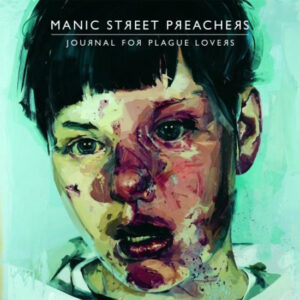It seems strange now, looking back, at how much the feather-boa wearing hordes focused in on ‘The Holy Bible’, raising it up as the archetypal Manics’ sound, somehow betrayed when they became popular. In truth the Manics were always about change. Just as ‘Gold against the Soul’ was years ahead of their sub-Guns ‘n’ Roses debut, so ‘The Holy Bible’ improved upon that (vastly underrated) record; the mistake was imagining that they would ever be content to stop there. Thus looking back over the Manics’ back catalogue is both a satisfying and disjointed affair, displaying gutter-punk, Cure-esque melancholy, upbeat pop and myriad other styles and influences while still sounding like the Manics.
‘Journal for plague lovers’ is the first album to feature Richey Edwards’ lyrics since ‘Everything must go’. This alone is enough to have old school fans, enticed in by the surprisingly rocky sound of ‘Send away the tigers’, salivating and decrying ‘Holy Bible 2’. It was never going to happen, of course, and it doesn’t. Instead what we have is a refinement of the raw sounding ‘Send…’ and a short, sharp collection of thirteen songs. Indeed, if the mid-nineties Manics epitomised excess, with seventy-five min running times on their CDs, so the modern Manics are masters of understatement, cramming maximum vocabulary into the minimum amount of space.
Kicking off with a creepy quote from ‘The Machinist’, (yes, the samples have returned) ‘Peeled Apples’ is a taut, lean rocker, surfing on the type of malicious bass riff not heard since ‘Archives of pain’. ‘Jackie Collins Existential Question Time’ (the first single) is up next, and features the cheeky chorus line “Oh mummy, what’s a sex pistol?” with a heavily riffed bridge that shows us that James’ voice has lost none of its power. ‘Me and Stephen Hawking’ is built around a bad joke “missed the sex revolution when we failed the physical” and a memorable hook, while ‘This joke sport severed’ is an acoustic ballad complete with understated strings and James’ haunting howl. In stern contrast the album’s title track drags itself along on an uneasy riff and Holy Bible-esque drums, while ‘She bathed herself in a bath of bleach’ has a fantastic chorus that I can imagine fields of people shouting along to despite the hideous images the title invokes.
The album takes a moment to breathe with ‘Facing page: top left’ which sees James tortuously fitting Richey’s lyrics over a pretty backdrop which is reminiscent of ‘Small black Flowers’ before launching itself off with ‘Marlon J.D.’ which sounds worryingly similar to The Stranglers ‘No more heroes’, all synth beat and trash punk guitars. ‘Doors closing slowly’ sounds like the last waltz at the local disco and then ‘All is Vanity’ worms its way into your consciousness via a snaking bass line and Sean’s off-kilter drums. ‘Pretension/Repulsion’ is a fantastic song that recalls vintage Clash, ‘Virginia State Epileptic colony’, meanwhile, is a pretty pop song that sounds a little like Ash at the peak of their powers. ‘William’s last words’ closes the album, and is sung by Nicky whose voice, while never the strongest weapon in the Manics’ arsenal, is so raw with emotion that it conveys perfectly the sense of loss that these talented musicians must still feel over the loss of their friend.
In the final analysis this is a fine album that is both unpretentious, and, at times, heart-breakingly sad. Richey’s lyrics have been treated with respect and care, and the band has crafted an album of difficult rock and tortured pop. It is not an easy album, to be sure; the production is hard to love (Steve Albini strikes again) and the songs are not instant, but scratch beneath the surface and there is much to admire.
Special edition supplemental content
If you’re a fan of the band, then the special edition is something of a must. Packaged in a replication of Richey’s notebook, complete with scribblings and pictures, it helps to see the lyrics in their original form (many of them have been necessarily altered to avoid James breaking his teeth trying to sing them), and containing a CD of demos for every track on the album, it offers much for the collector. The demo CD, while not earth shattering, offers a glimpse of the genesis of these songs before Albini got his hands on them, and certain songs benefit from this (particularly Jackie Collins…), particularly as the vocal sound is much warmer than Albini’s abrasive treatment of James’ voice.
Manic Street Preachers – A Journal For Plague Lovers (Sony Music – 2009)




